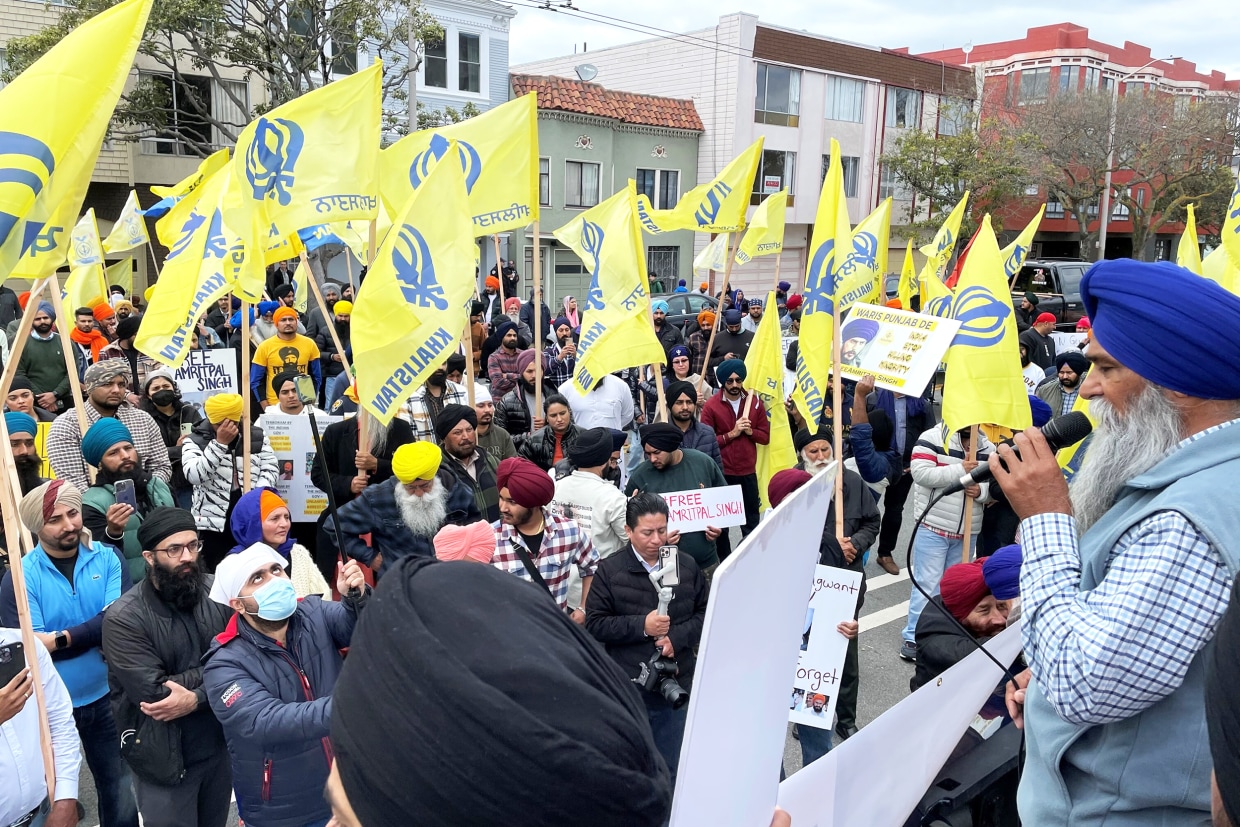- Joined
- Apr 14, 2011
- Messages
- 20,550
- Points
- 113
Protests erupt across the U.S. amid internet shutdown in India and manhunt for activist
Sikh activists have demonstrated in cities like Chicago, Sacramento and New York as Indian officials search for Sikh figurehead Amritpal Singh.
By Brahmjot KaurMarch 23, 2023, 9:16 PM EDT

Protests have emerged in major cities like Los Angeles and New York in response to the Indian police search for Sikh activist Amritpal Singh. The demonstrations echo civil unrest in the Punjab state of India, where protests in several Punjab cities, including Ajnala and Mohali, began Sunday and led the government to shut down internet access for 27 million people there.
At protests outside Indian consulates and embassies in the U.S., people waved flags and chanted in support of the Sikh separatist movement to create a nation called “Khalistan,” meaning “the land of Khalsa.” Similar demonstrations have also taken place in England, Australia and Canada.
The reasons Sikh activists are gathering are many. In cities like Chicago and Sacramento, California, they quickly organized rallies to raise awareness about India’s lack of transparency with its rule of law, its previous human rights violations and the search for and possible arrest of Singh.
Singh is a figurehead for a number of causes. He quickly became known in India for his strong anti-drug values, concern for Punjab’s water crisis and denunciation of the government.
Police in Punjab are still searching for him, according to Punjab Inspector General Sukhchain Singh Gill and Indian news outlets. Gill told The Times of India that the Sikh activist is wanted on charges of “creating disharmony among classes, attempt to murder, attacking cops and preventing them from carrying out their duties.”
Kunarveer Singh, an organizer for the Sikh advocacy group California Sikh Youth Alliance, said the diaspora has a responsibility to mobilize.
“We’ve realized if no one else is going to speak up for us, then you have to do it yourself,” he said. “There’s no media blackout here. So if they can’t do it [in India], we very much will here.”
He said that the outrage goes beyond Amritpal Singh and that protesters more broadly oppose India’s treatment of minority religions.
“Protests are us in the diaspora doing as much as we can. Sikhs in the diaspora can only do so much on the ground, and that is protesting and making sure that the Western Hemisphere is aware that the so-called democracy of India is not functioning as a democracy,” he said.
Kunarveer Singh said protesters would most likely continue to rally until Amritpal Singh is free. Many Sikhs have the last name Singh, and those named in this article are not immediately related.
Harpreet Singh, a Sikh scholar of South Asian traditions and languages and a chaplain at Harvard University, said the activist’s popularity is unsurprising.
“Amritpal Singh has been a voice against the drug epidemic in Punjab, and many of the people that have been implicated in the drug epidemic have been part of the Indian government,” he said.
Singh of Harvard said he is also unsurprised by how the Indian government has responded to Amritpal Singh’s notoriety, because religious minorities are often targets in India, especially with the continuous rise of Hindu nationalism.
“There is a long history where India has become a Hindu nationalist state. So the reason why Sikhs are being targeted today is that they are looking for autonomy to practice their religion and to practice their faith freely in a largely Hindu-dominated country,” he said.
The Indian Embassy and the central police department in Punjab did not reply to requests for comment.
Internet services were first suspended Saturday in Punjab, and the suspension was extended over three days, said Namrata Maheshwari, the Asia Pacific policy counsel at Access Now, a nonprofit internet advocacy organization. The suspension was extended in some areas and will continue until at least Friday afternoon, according to The Times of India.
India has had the most internet shutdowns in the world for the last five years, with at least 84 in 2022, according to a new report from Access Now. The group defines a shutdown as affecting “a specific population or within a location, often to exert control over the flow of information.”
Maheshwari said that such blackouts are common tactics for the Indian government but that this one is among the most extensive the organization has seen. India is considered the largest democracy in the world, and she said the internet shutdown goes against those beliefs.
“The ability to exchange information, verify it and communicate freely is essential to journalism and political engagement, and the internet is a crucial medium for exercising the freedom of expression,” she said. “Without access to the internet, it is extremely difficult, if not impossible, to report with accuracy and in real time. It also has the effect of stifling free speech and curbing dissent, which is incompatible with democratic ideals.”
The state appears to have blocked access in India to Twitter accounts for prominent Sikh figures and organizations like the poet Rupi Kaur, the nonprofit group United Sikhs and the Canadian politician Jagmeet Singh.
For many Sikhs, the recent events have felt reminiscent of the beginning of the 1984 anti-Sikh attacks in Delhi, where the Indian military-run destruction of the Golden Temple complex led to the assassination of then-Prime Minister India Gandhi by her Sikh bodyguards. Her assassination led to organized riots, often instigated by the Congress Party, in which mobs of non-Sikhs kidnapped, killed and raped thousands of Sikhs, according to Human Rights Watch.
